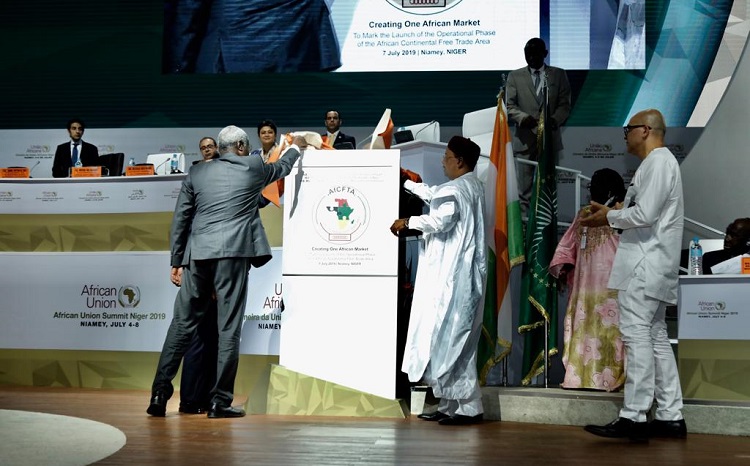This content has been archived. It may no longer be relevant
The African continental free trade area (AfCFTA) is critical in delivering development and prosperity within the continent says African Union Commissioner for Trade and Industry, Muchanga Albert.
Speaking on Thursday in Addis Ababa, Ethiopia, he said AfCFTA broadens policy space for development and key in reducing conflicts.
“With the AfCFTA working and producing tangible benefits, Africa will be able to create conditions for ending poverty and unemployment; poverty and unemployment are some of the key factors that generate social and political tensions, which if left to linger, can transform into tension and conflicts,” noted the Commissioner.
The ongoing 33rd AU summit themed ‘Silencing the Guns: Creating Conducive Conditions for Africa’s Development’ commenced on 21st January, will run until the 10th of February.
Silencing the Guns is a commitment to achieve the Aspirations of Africa’s Agenda 2063, specifically Aspiration 4, which envisions a peaceful and secure Africa, thereby making peace a reality for African people.
“The advocates of free trade have long argued that its benefits are not merely economic. The advocates advise us that free trade also encourages people and nations to live in peace with another.
They also point out that free trade reduces the possibilities of war by making nations more economically interdependent because free trade makes it more profitable for people of one nation to produce goods and services for people of another nation,” he said.
Currently, 54 states have signed the agreement establishing the AfCFTA.
However, only 28 countries have ratified and deposited the instruments of ratifications with the AU.
The AU Commissioner said that more are expected to deposit instruments of ratifications during the summit.
“When we look at the historical trend, it takes five years for the AU legal instruments to enter into force.
The AfCFTA has been an exception; we opened for signature on the 21st March 2018 and in the period of one year, one month, one week, and one day, we got the minimum 22 ratifications required it to enter into force.
This shows the strong political commitment of member states and governments have towards this agreement. So, we are confident that we are moving in the right direction and we are taking the step,” he said.
READ:
- AU Calls for Multilateral World Order that Will Respond to its Agenda 2063
- US Based Firm Launches AGOA Export Training Course for Africa’s Exporters
- Kenya and the U.S. Initiate Trade Deal Talks on Post AGOA
The AfCFTA will bring together all 55 AU member states, covering a market of more than 1.2 billion people, including a growing middle class, and a combined gross domestic product (GDP) of more than 3.4 trillion U.S. dollars.
In addition to the key discussions around the Theme of the Year 2020 and the road towards implementation of Africa’s peace and security agenda, other headline issues to be deliberated upon during the summit include sustainable funding of Africa’s development agenda specifically addressing the scale of assessment and contributions to the AU’s budget; progress made in the implementation of Agenda 2063; operationalization of the Africa Continental Free Trade Area (AfCFTA); African candidatures in the international system, the International Criminal Court, and Africa’s Digital Transformation Strategy.




